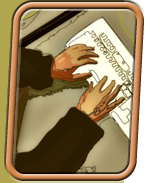|
|
||||||
|
|
|
|
||||
|
|
|
|
|
|
||
|
|
||||||
|
|
|
|
||||
|
|
|
|
||||
|
|
|
 |
|
|
|
|
|
|
|
|
|
|
|
|
|
|
|
|
|
|
|
|
|
|
|
|
|
Interview with Peter Kranz, Paleontologist The Washington Post Magazine I knew from the time that I was a preschooler that I wanted to be a paleontologist. The primary appeal is figuring out puzzles. These are ancient crimes, in a sense, and we're kind of detectives. In "Jurassic Park," I've never understood why they took a paleontologist who does that kind of work. Because, basically, his skills aren't suited to working with the living animals. We do fine with the dead things. The most important thing that I feel that I have found in the way of a fossil was this small tooth. It took eight years before people were willing to say, this is something new and completely different. It's the first evidence of a horned dinosaur ever from the eastern United States. It's never been written up in the newspapers because of the fact that the reporter or the TV comes in and says, "This is the dinosaur? You discovered a new dinosaur--and this is it?" They want to see a huge skeleton. What's scientifically important is not what's considered dramatic by the public. The majority of the paying work is working with kids. We do dinosaur birthday parties. Kids want paleontologists to come to their parties, and parents are usually flabbergasted that it's possible to get a paleontologist to actually come. We do field trips, dinosaur digs, presentational programs. What the kids do is that they spread out at the site, and they look for stuff. They find lots of things. And then they bring it to me, and then I can tell them generally what they are looking at. They're having a real experience relative to science. Most scientists spend most of their time behind the desk doing paperwork, going to meetings. I get to spend my time out looking for dinosaur bones, having fun.
|